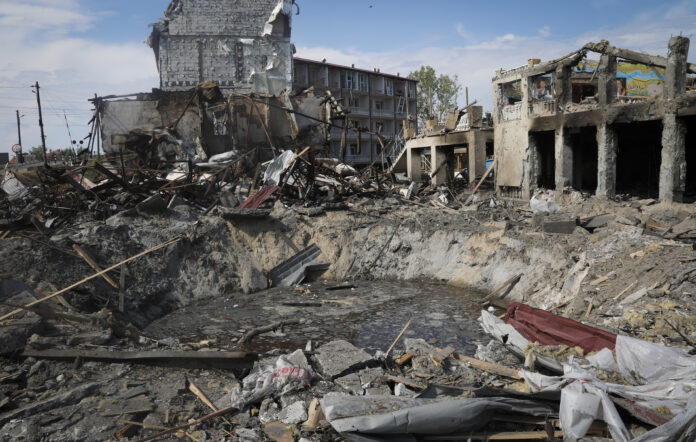Explosions erupted overnight near military bases deep within Russian-held areas of Ukraine and in Russia itself, an apparent display of Kyiv’s growing ability to wreak havoc on Moscow’s logistics far from front lines.
Ukraine also issued a new warning about a frontline nuclear power station where it said it believed Moscow was planning a “large-scale provocation” as a justification to decouple the plant from the Ukrainian power grid and connect it to Russia’s.
In Crimea – the peninsula Russia seized and annexed in 2014 – explosions were reported near an air base in Belbek, on the southwest coast near Sevastopol, headquarters of Russia’s Black Sea Fleet. On the opposite end of the peninsula, the sky was also lit up at Kerch near a huge bridge to Russia, with what Russia said was fire from its air defences.
Inside Russia, two villages were evacuated after explosions at an ammunition dump in Belgorod province, near the Ukrainian border but more than 100 km from territory controlled by Ukrainian forces.
Kyiv has cultivated an atmosphere of ambiguity around such explosions by withholding official comment on incidents in Crimea or inside Russia, while hinting that it was behind them, using long-range weapons or sabotage.
Russian officials reported no one hurt in Crimea or Belgorod. They said they had shot down drones in Belbek and Kerch, and confirmed that they had ordered the evacuation of two villages in Belgorod where they were investigating the cause of a fire.
“It certainly looks bad – or good – dependent on the perspective,” tweeted former Swedish Prime Minister Carl Bildt, with video showing huge flames and smoke in the night sky, purportedly at the Russian base in Belbek. Reuters could not confirm the authenticity of the video.
UN can facilitate IAEA visit to Zaporizhzhia nuclear power plant if Russia, Ukraine agree
Closer to the front, Kyiv also announced a number of strikes overnight behind Russian lines in southern Kherson province, including at a bridge at the Kakhovska Dam, one of the last routes for Russia to supply thousands of troops on west bank of the Dnipro River.
“The Ukrainian armed forces treated the Russians to a magical evening,” Seriy Khlan, a member of Kherson’s regional council disbanded by Russian occupation forces, wrote on Facebook.
Ukraine hopes its apparent new-found ability to hit Russian targets behind the front line can turn the tide in the conflict, disrupting supply lines Moscow needs to support its occupation.
In recent days, it has been issuing warnings to Russians, for whom Crimea has become a popular summer holiday destination, that nowhere on the peninsula is safe as long as it is occupied.
Last week, a Russian air base on the Crimean coast was hit by simultaneous blasts that destroyed warplanes and left huge impact craters visible from space. Tourists were photographed at nearby beaches, staring up from cabanas at huge mushroom clouds in the sky.
Ukraine has been making use since last month of advanced rockets supplied by the West to strike behind Russian lines. The overnight explosions in Crimea and Belgorod are beyond the range of ammunition Western countries have acknowledged sending so far.
Ukraine’s nuclear power operator said on Friday it suspected Moscow was planning to decouple the Zaporizhzhia nuclear power plant from Ukraine’s grid, a complex operation that Kyiv says could cause a disaster at Europe’s largest atomic plant.
The power station is held by Russian troops on the bank of a reservoir; Ukrainian forces control the opposite bank.
Moscow has rejected international calls to demilitarize the plant and accuses Kyiv of shelling it. Kyiv denies this and says Russia is using the plant as a shield for forces that fire at Ukrainian-held cities, which Russia denies. Reuters cannot independently verify the military situation at the plant.
A look inside Russia’s ‘troll factory’ behind disinformation campaign against Ukraine
UN Secretary-General Antonia Guterres, visiting Ukraine, repeated his calls to demilitarize the plant after talks with Ukrainian President Volodymyr Zelenskyy on Thursday.
“The facility must not be used as part of any military operation. Instead, agreement is urgently needed to re-establish Zaporizhzhia’s purely civilian infrastructure and to ensure the safety of the area,” Guterres said.
Russia has said Ukraine might carry out some kind of “provocation” at the nuclear plant during Guterres’s visit, which continues on Friday. Kyiv has called that an ominous indication that Russia itself might be preparing to stage an incident to justify cutting the plant from the Ukrainian grid.
Zelenskyy said after meeting Guterres that they had agreed parameters for a possible mission to the plant by the UN nuclear watchdog, the International Atomic Energy Agency.
“Russia should immediately and unconditionally withdraw its forces from the territory of Zaporizhzhia nuclear power plant, as well as stopping any provocations and shelling,” Zelenskyy said.
Meanwhile, Russian forces have stepped up their shelling of civilian areas of Kharkiv, Ukraine’s second largest city, in recent days, in what British intelligence described as an apparent attempt to force Ukraine to keep troops in the area.
Seventeen people were killed and 42 wounded in two separate Russian attacks there in the past two days, the regional governor said on Thursday. Five more rockets hit the city early on Friday killing at least one person, he said. Moscow denies targeting civilians.
Thousands of people have been killed and millions forced to flee since Russia launched its invasion on Feb. 24, saying it aimed to demilitarize Ukraine and protect Russian speakers on what President Vladimir Putin called historical Russian land. Ukraine and Western countries view it as a war of conquest aimed at wiping out Ukraine’s national identity.
© 2022 Reuters



